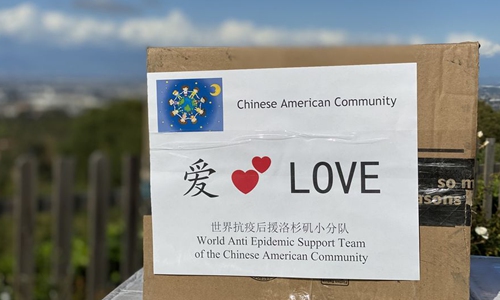Human rights experts decry racial discrimination during pandemic
By Hu Yuwei Source:Globaltimes.cn Published: 2020/7/6 0:16:57

Photo taken in Los Angeles County on March 26, 2020 shows donations from the Chinese-American community in Palos Verdes, Southern California, the United States.Photo:Xinhua
The current pandemic requires state leaders to defend and protect the dignity of all people irrespective of race and ethnicity, and governments should commit to achieve racial equality, adopt a non-discrimination principle in their fight against the virus, experts urged.
Nearly 20 global experts from China, the US, the Netherlands, Germany and South Africa, in human rights sector reached an agreement in a recent online seminar focusing on "Addressing Contemporary Forms of Racism: Challenges Posed by the Pandemic and the National Responses."
Experts at the seminar called for greater commitment and efforts from governments to ensures the COVID-19 pandemic responses are not fueled by xenophobia and racial discriminations, as the pandemic has witnessed an apparent increase in racist and xenophobic incidents targeted certain groups based on their race, ethnicity or national origins over the past few months.
Media reports have repeatedly revealed how racially motivated violence and racist attacks related to the coronavirus against people of Asian-descent or someone perceived as Chinese are reaching an alarming level in some regions.
Tendayi Achiume, Special Rapporteur on contemporary forms of racism, racial discrimination, xenophobia and related intolerance from the University of California, argued that "it is dismaying to witness state officials adopting alternative names with geographic references, typically referring to its emergence in China, for the COVID-19 coronavirus, instead of using the internationally recognized name of the virus."
"This sort of calculated use of a geographic-based name for this virus is rooted in and fosters racism and xenophobia. It serves to isolate and stigmatize individuals who are, or are perceived to be of Chinese or other East Asian descent," said Achiume.
She stressed that such irresponsible and discriminatory rhetoric used by some US politicians "is no minor issue," as populist regimes in many countries are exploiting and fueling national anxieties about the virus and doubling down on demonization of racial, ethnic and religious minorities while flouting checks and balances on their power.
"Not surprisingly, leaders who are attempting to attribute COVID-19 to certain national or ethnic groups are the very same nationalist populist leaders who have made racist and xenophobic rhetoric central to their political platforms," she argued.
"Political responses to COVID-19 that stigmatize, exclude, and make certain populations more vulnerable to violence are inexcusable, unconscionable, and inconsistent with states' international human rights law obligations," she said.
Brij Mohan, Dean Emeritus and Professor of the School of Social Work at Louisiana State University, noted that poor and black families in the US have disproportionately suffered the coronavirus pandemic.
The inequality engine is driven by ideologies that sustain white privilege and systemic brutality and injustice, Mohan argued, saying a pernicious belief system breeds inequality and injustice that calls for radical transformations to combat the politics of pandemics.
Serges Alain Djoyou Kamga, Professor of Human Rights from Thabo Mbeki African Leadership Institute at University of South Africa, also recognized the "color-coded" and "white-over-black" ideologies "are well hidden under the formal equality echoed by the 14th amendment of the USA Constitution." He said the US is suffering dilemmas and challenges in combating racism and racial discrimination.
"Racial hate speech has emerged in diverse countries during the epidemic, and it has not only affected many ethnic minority groups, but also posed a threat to international solidarity in the fight against the epidemic," Sun Shiyan, the professor of Institute of International Law at Chinese Academy of Social Sciences, said during the seminar.
Taking the instance of how the Chinese community in the Netherlands "has suffered and is still suffering from racism," Tom Zwart, Director of the Cross-cultural Human Rights Centre, Vrije Universiteit Amsterdam, underlined that the Chinese community has now moved from indirectly challenging racist comments to tackling them head on. The assertiveness of the younger generation played a decisive role in this transformation to a direct public rebuke, he added.
Virus-related discrimination against any group or ethnicity in the name of "free speech" is unacceptable, said Mao Junxiang, Executive Director of Central South University Human Rights Center, Vice dean of School of Law at Central South University.
Mao urged Western politicians and media to restore their social responsibility and refrain from spreading racist and xenophobic remarks that are detrimental to international cooperation in fighting the epidemic.
"The Chinese people have made great contributions to international public health and a lot have been sacrificed in providing valuable experience on how to fight the virus," he said. "They deserve the support of the global community rather than groundless accusations."
Posted in: SOCIETY,CROSS-BORDERS